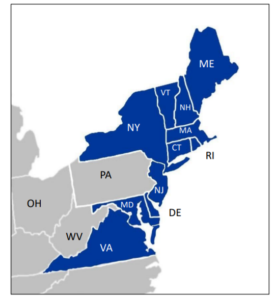
by Steve Haner
First published today by the Thomas Jefferson Institute for Public Policy.
The high consumer cost of Virginia’s forced conversion to a fossil fuel-free economy remains unpopular with Republican and Independent voters, but is supported by many Democrats, a recent poll revealed. Even Democrats, however, dislike a new carbon tax that is now targeted for repeal.
Thomas Jefferson Institute for Public Policy asked Mason-Dixon Polling & Strategy to include four energy policy-related questions on a recent survey of 625 registered Virginia voters. All touch on issues pending at the 2022 General Assembly or facing the new Glenn Youngkin Administration.
Only 22% percent of overall respondents supported, and 73% opposed, the new carbon tax that now appears on Dominion Energy Virginia monthly bills. It was imposed in September to recover from customers the dominant electricity provider’s costs under the Regional Greenhouse Gas Initiative (RGGI).
Governor Youngkin has made removing Virginia from the RGGI compact an early priority. Even self-identified Democrats in the sample opposed it by 59% to 36%, with 91% of Republicans and 73% of Independents expressing opposition.
You can read the four questions and see the response breakdowns in this report from the polling organization, which has a long history of sampling Virginians on campaign and policy questions without any partisan leaning by the firm.
The 22-to-73 result on RGGI has statistical significance. When Virginians understand that RGGI is a direct tax on their monthly bill, which will continue to grow, they oppose it.
RGGI was described in the question as costing residential consumers from $25 to $30 per year, based on typical household usage, with an increase expected next year to $50 to $60 dollars. That is based on the actual current tax and an increase for late 2022 proposed by Dominion. Conserving electricity lowers the RGGI tax, and advocates are happy it creates a disincentive.
Much larger consumer costs are expected as a result of the proposed conversion of major generation facilities to renewable sources. Another question about that, citing $700 per year as a likely residential cost increase (a State Corporation Commission review estimate), actually drew a more positive response than the RGGI question: 31% of respondents in favor and 64% opposed.
Republicans opposed that 91% to 7%, and Independents opposed it 60% to 33%. Democrats narrowly supported it, 48% to 47%. It was also most popular in the Northern Virginia region, with 44% in favor and 48% percent opposed. Several bills are pending to repeal or amend the 2020 legislation driving the utilities to close fossil fuel plants and focus on wind and solar.
Democrats were even stronger in their support for an element of the 2020 legislation that creates a subsidy program to help low-income Virginians pay electric bills. Called the Percentage of Income Payment Plan (PIPP), it is a tax on all other electricity customers that will fund the subsidies. The amount of the tax won’t be set until the program is ready to start covering power bills.
Overall, only 37% of Virginians supported the idea and 58% opposed it. Democrats supported it 54% to 43%, and it drew the support of 19% of Republicans and 35% of Independents. Full repeal of the 2020 legislation would end this proposal, but not all pending bills on the issue include PIPP repeal.
A much stronger partisan divide appeared on the final question, dealing with a new state regulation that marries Virginia vehicle fleet fuel economy rules to those of the State of California. Rules in California will apply in Virginia as well, without any Virginia agency needing to act. The California Air Resources Board has control of Virginia policy as of 2025, and it is preparing to ban the sale of gasoline and diesel cars and trucks by 2035.
That was the question posed: “Do you support or oppose banning the sale of new gasoline or diesel-powered cars and trucks in Virginia after 2035?”A full third of Virginians expressed support, including 53% of Democrats, 35% of independents, and 52% of Northern Virginians. Republicans opposed it 93% to 6%.
Hostility to fossil fuels is deeply embedded now in parts of the Virginia population, in particular with Democrats and Democratic-leaning Northern Virginians. Most of them are ready to ban their use in cars and trucks, it seems, and are ready to pay a huge premium on their monthly electric bills to get mainly wind and solar power.
But they remain a vocal minority, with the Independent, Republican and downstate population skeptical of or hostile to this vision of our energy future. The key to finding out where Virginians really stand is to be honest about the likely cost. Idealism is easier without a price tag.
We saw this two years ago, when the Jefferson Institute specifically polled on a similar issue dealing with a proposed carbon tax on motor vehicle fuels. Mention the claimed environmental benefits, and the idea was applauded, but add in the information about the tax and many voters suddenly lost enthusiasm.

Leave a Reply
You must be logged in to post a comment.